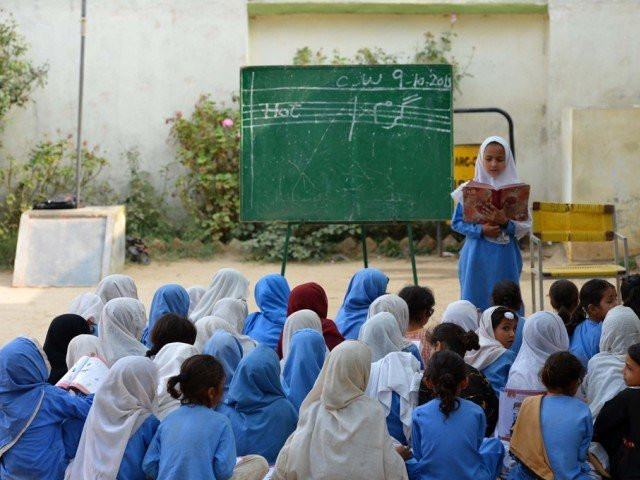State of education: Report takes stock of Punjab’s 5-year education performance
Alif Ailaan's report says regardless of budgetary allocation for education, govt has been unable to utilise budget

Over 11 million children out of school in Punjab PHOTO: AFP
This was the crux of the views expressed by the speakers at the launching ceremony of the report titled 2013-2018 Five Years of Education Reform: Punjab Wins, Losses and Challenges for the Future 2018-2023 by Alif Ailaan at the 90-Shahrah-e-Quaid-e-Azam on Wednesday.
On the education reforms the report stated, "These reforms put a special emphasis on higher enrolment and retention, improved learning outcomes and quality of education, and a better managed, monitored and administered education sector," it said.
According to the report, "Some of the flagship efforts under the programme include developing improved monitoring systems, improving the provision and quality of teaching, restructuring of governance systems through District Education Authorities (DEA), a robust public-private partnership programme through Punjab Education Foundation (PEF), and the development of interventions that strengthen incentives and accountability for service delivery performance."

"The last five years witnessed a substantial level of political and financial investment backed by unprecedented technical innovation in tackling the education crisis in Punjab, but the gains of the reforms enacted are still fragile. Enrolment, retention, learning outcomes, public financial management, school infrastructure, discrepancies in the data regime and centralisation of all these efforts continue to pose substantial challenges to the provincial authorities," it added.
The report shows that regardless of the increased budgetary allocation for education, the Punjab government had been unable to utilise the budget. It said that the provincial government was unable to substantially increase enrollment in middle and high schools as only 0.5 million students were enrolled in middle and 0.2 million students were enrolled in high schools.
The report said that the overall school infrastructure, according to the assessment of Alif Ailaan during the five years, showed that the overall score increased five points between 2013 and 2017, rising from 83.4 to 88.4. The report noted that Punjab showed an increase in enrollment figures in the five year period with primary school Net Enrolment Rate (NER) rose from 45% in 2001 to 70% by the end of 2016. "However, the NER has largely remained stagnant during the past five years," it added.
Speaking on the occasion, Punjab School Education Minister Rana Mashhood said, ‘‘The Punjab government has started Chief Minister's Stocktake Initiative and worked towards Public-Private Partnerships that have helped not only with accountability but also policy-making ensuring effective and timely solutions.''
He said that the provision of quality education was the priority of the Punjab government and for this purpose; the Punjab government had worked tirelessly. He asked the private sector to help the government for provision of quality education.
School Education Department Secretary Dr Allah Bakhsh Malik said that due to the steps of the Punjab government, the underprivileged class in the province had been receiving the quality education. He said, "The Daanish schools are the Aitchisons for the poor." The performance of the government could be gauged by the results of intermediate, matriculation and Punjab Examination Commission (PEC) results, he added.
Lahore University of Management (LUMS) School of Education Associate Dean Dr Mariam Chughtai said that the report had shown an alarming ratio of students in terms of retention from primary-level to the higher levels. She was of the view that the Daanish schools needed to provide quality education to everyone. She said that the country was not comparable to countries in the region in terms of literacy and was at the levels of sub-Saharan African countries. "This was more alarming as Pakistan is a nuclear power."
Citizens Foundation co-founder Ateed Riaz said that language was a major issue where all stakeholders should focus. "We should decide whether we want one or two languages in our education system," he said giving examples of Japan and Germany.
Published in The Express Tribune, March 8th, 2018.



















COMMENTS
Comments are moderated and generally will be posted if they are on-topic and not abusive.
For more information, please see our Comments FAQ